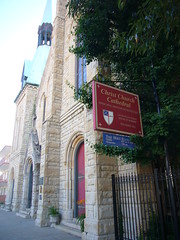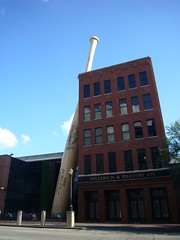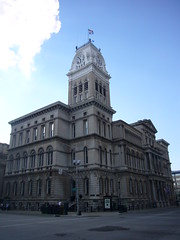This article is more than 5 years old.
From Thursday, June 17-Saturday, June 19, I attended the 2010 American Theological Library Association Annual Conference, held in Louisville, KY. This was my first time attending this conference since 2003, and it was nice to be back in a place where terms like ontology, hermeneutics and exegesis were used with the same frequency as FRBR, OCLC and LibGuides!
After arriving and exploring Louisville on Wednesday afternoon, and attending the opening reception in the evening, the first conference event was held bright and early at 7:30 Thursday morning. One of the unique things about ATLA is that they include several opportunities to visit local churches and experience various worship styles during the conference. With a large number of members working for specific denominations, and being ordained ministers themselves (as our own Sharon Snow was), these are popular events. So Thursday morning we met at the Christ Church Cathedral, around the corner from the hotel, for the Episcopal service of Morning Prayer.


Upon returning to the hotel, the first plenary session, “Describing and Accessing Resources-Where are We Headed,” was led by Dr. Barbara Tillett of the Library of Congress. She gave an overview of the changes from AACR2 (“take what you see”) to FRBR (“see connections”), and what some of these changes would mean for our catalogs, and for theological studies in particular. Specific changes to the LCSH she mentioned were removing the “OT” and “NT” abbreviations for Old and New Testaments and using the full words, as well as listing individual biblical books, ie, “Bible. Genesis.” rather than “Bible. O.T. Genesis.”
Tillett’s presentation was very helpful in explaining some of these changes to a non-cataloger. I know it at least made sense while I was listening to her!
After visiting the exhibits opening, I attended “Where’s the Data? A Research Agenda for Next Generation Catalogs” by Lisa Gonzalez from Catholic Theological Union in Chicago. Her presentation was a lit review of recent research on surveys and improving online catalogs. She described the research and what was missing, as well as the type of usability testing they completed at CTU (where they are also a Voyager/vufind hybrid). Several hints and guidelines from her experience and research:
- minimum of 5 students
- use generic terminology, what students would understand
- write up your questions along with your rationale, or what issue you are attempting to evaluate
- make sure that you aren’t confusing qualitative (observation, interviews) with quantitative (surveys, transaction log analysis)
- try card sorting! A lot of usability questions may be better answered by a card sorting exercise.
My afternoon sessions started with “Historiography for the Study of the New Testament” by Beth Sheppard of Garrett-Evangelical Theological Seminary. She encouraged librarians to be trend spotters in our collection development practices. Rather than waiting for faculty members to make requests, librarians should pay attention to publications and presentations in our subject disciplines in order to notice new and developing fields of research. This will allow us to have a collection at the ready when faculty members want to incorporate a new perspective into their own teaching or research. She gave several things to watch for:
Internal (own school):
- curriculum change-faculty may be looking for a change in their course and use it as a “lab” to try out new ideas
- new hires-older faculty may want a new faculty member to bring in new, different ideas, to fill in generation gaps
- ILL-faculty are more likely to recommend an item to students and colleagues after they have used it, so we should make an effort to purchase recently requested titles
External:
- new sections and consultations at conferences-at the Society of Biblical Literature (SBL) conference, the “Jesus, John and History” test section is becoming a permanent section, indicating increased interest and research in that area
- subject fatigue-when terminology becomes too prevalent in publications and conferences, faculty will start looking for other areas to research
One example: In 2003, a paper was presented at SBL on “Reading the Signs of the Times: The New Testament in the Historical Context of Rome,” which led to an increase in publications on the topic of “empire” in the following years. As everything has been focused on the political aspect of empire, and from one analytical perspective, other researchers will start looking at other topics, such as economics and empire (clothing styles, pottery types, trade routes, fishing) or from different perspectives (post-colonial, counter-factual).
This was a really interesting presentation and gave me several good ideas, as well as a good overview of the variety of historiographic approaches in biblical studies.
The last session for the day was “Kissing Your Handouts Goodbye: How LibGuides Can Revolutionize Your Instruction” by Michelle Spomer of Azusa Pacific University (http://apu.libguides.com/kisslibguides). Spomer used her LibGuide as a presentation tool during her talk, briefly demonstrating the various features of the LibGuides software and how they look in practice. While most of the examples were things we already do here at ZSR, it was nice to see a different implementation. A few things I was inspired to work on this summer:
- getting book covers into my LibGuides and experimenting with the book display
- adding “star” rankings to my databases
- adding a link to the WFU plagiarism/academic integrity pages on my citation page
- embedding screenshots
- experimenting with a preset google web search box (one example she gave was for “‘social work’ site:edu OR site:org”)
After I dropped off all of the catalogs and swag I picked up in the exhibits, I did a little more exploring in downtown Louisville and got a good nights sleep!



More pictures at my flickr page!

2 Comments on ‘ATLA2010-Day One’
Love it!!! “a place where terms like ontology, hermeneutics and exegesis were used with the same frequency as FRBR, OCLC and LibGuides!”
haha, never did know the difference between hermeneutics and exegesis. Glad you do!